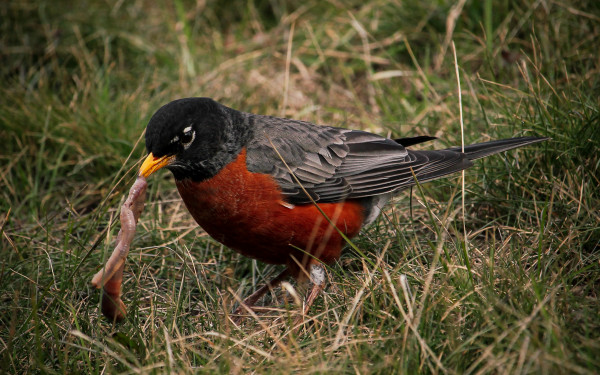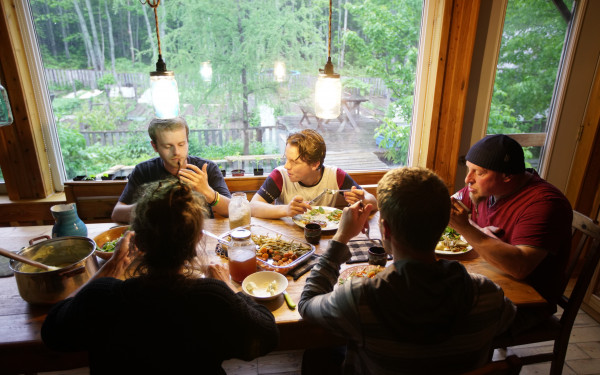Rooted In Music
Orchestral Folk-Pop Band Lost In the Trees Share Their Organic, Creative Process
Ari Picker wanted to give his band “a dramatic feel to it” when he decided upon the moniker Lost in the Trees in 2007. Coincidentally, it’s the band’s music, not its name, that is helping keep Canada’s wilderness alive.
The five-piece orchestral folk-pop group from North Carolina is venturing through the forests of Canada this month and contributing to their growth, pairing with non-profit organization Tree Canada and handing out free tree saplings at their Canadian shows.
“I worked in the music industry for almost two decades and met some amazing and inspiring people along the way,” said Richard Walker, head of communications at Tree Canada. “One of them works for [Lost in the Trees]’ Canadian label and posted a song of theirs on Facebook.
“After listening to it, I instantly loved the band,” he continued. “I contacted my friend and asked [if they could do] something with Tree Canada during their Canadian leg of the tour.”
A trip to Canada was the last thing on Picker’s mind when he first started the band seven years ago.
After graduating from Berklee College of Music in Boston with a formal training in classical music, Picker wanted to burst out of his academic bubble with the creation of Lost In the Trees.
“After college I was listening to a lot more contemporary music and seeing a lot of bands at festivals, so I was less isolated musically speaking,” said Picker, the band’s writer and lead vocalist.
Picker started by writing songs in his bedroom and sending out demo CDs to record companies. He eventually formed the band with friends he had met in the orchestral music program and they were signed to Trekky Records.
Over the years, Picker says the band has changed in significant ways, with the size fluctuating and plenty of experimentation done within different musical genres.
“Our past records were influenced by classical music, because that’s what I was studying and I was in my classical bubble,” he said.
Their newest album, Past Life, set to be released on Feb. 18, has minimalist modern sounds and puts an emphasis on rhythm and groove.
“This album is more abstract and open. We tried to be more hands-on and develop an emotional reaction from listeners, versus having a particular theme like the past album,” Picker said. “The purpose was having fun making this record during the process.”
The band’s intention was to move away from themes of loss—their previous record, A Church That Fits Our Needs, released in 2012, was largely fuelled by Picker’s mother’s suicide in 2008.
“I think each album is its own musical experiment. I wanted the process to be more external whereas the others were a lot more personal and intentional. The goal was to make this album more spontaneous, fun and free,” he said.
“So it turned out a lot more pop. The song structures are based on loops and beats. So, it’s definitely more groovy, and a little fancy and certainly a lot more powerful to play live.”
Picker explained that many of his inspirations came from paintings he had seen in museums, poems he had written and books he had read.
“It was assembled like a collage—copy-paste kind of lyrical experiment versus every line having a ton of weight,” he said.
A Bag of Trees
Aware of the large carbon footprint a touring band leaves behind, Lost in the Trees decided to collaborate with non-profit green organization Tree Canada for their Canadian tour this month.
“Music has many purposes, and one of them is a responsibility not only for the creation of art but to leave a positive impact in other ways,” said Picker.
Tree Canada’s mission is to maintain a healthy environment in the true North by sustaining urban and rural forests. Thus far, the group has planted over 80 million trees across Canada through different and diverse programs. Their goal is to raise awareness of the importance of trees to all age groups.
At the end of every concert during their Canadian tour, tree saplings will be distributed to fans. They are then encouraged to nurture the saplings into thriving trees, in order to replenish the Earth with life.
Walker said that Tree Canada collaborating with Lost In the Trees was “the perfect vehicle to engage a demographic through something they love.”
“We even have a contest set up for people who pick up saplings to post how they will care for the tree and where they will plant it. Prize packs will be given to the best plants in each city,” Walker said.
“The best thing to do is to plant it in a pot with some soil, water it every other day until the ground thaws and plant in your backyard or neighbourhood park. The best times to plant are late April to mid June and late August to late October,” he added.
Lost in the Trees + All Tiny Creatures // Feb. 22 // Il Motore (179 Jean Talon St. W.) // 8 p.m. // $14 door, $12 advance



3_600_375_90_s_c1.jpg)


